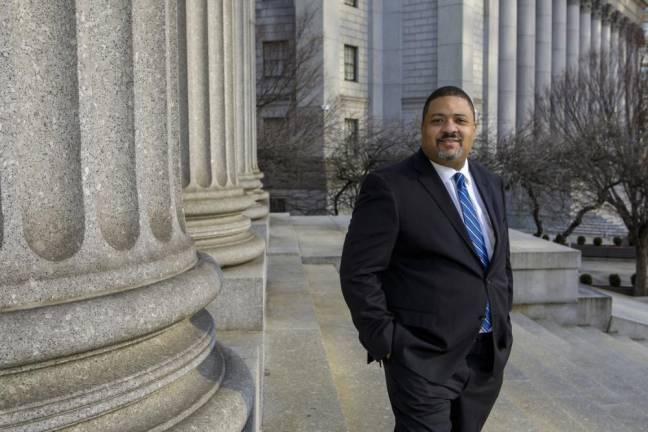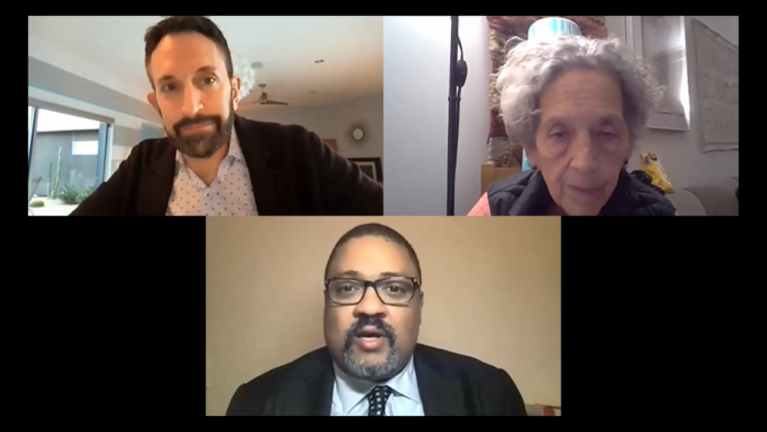Elections have consequences. That is a popular refrain in these days of hyper-partisan struggle. But what if few people are paying attention to the election? What then the consequences?
That question dogged Manhattan’s new district attorney, Alvin Bragg, as three weeks into office he asked for a do-over.
“I understand why those who read my memo of January 3rd have been left with the wrong impression about how I will enforce New York’s laws,” Bragg told a group convened on Zoom by New York University Law School. “I take full accountability for that confusion caused by the memo. It was unclear and legalistic, put out to the public domain, and left many New Yorkers justifiably concerned for how we will keep them safe.”
The appearance was one of four he held last Thursday to try to tamp down the controversy that has accompanied him into office. This may well have been the first political mea culpa tour in which a major elected official did not leave his computer.
First, Bragg met with his own staff over Zoom. Then he spoke to the Zoom conference at NYU, moderated by a member of his transition committee, Professor Rachel E. Barkow, whose 2019 book, “Prisoners of Politics,” offered policies for “breaking the cycle of mass incarceration.” Then he held a Zoom news conference and wrapped up his day with a Zoom appearance before an audience gathered by the Marlene Meyerson JCC in Manhattan.
He got up the next day and met virtually with the Partnership for New York City, whose members expressed deep concern that fear of violence was deterring their employees from coming back to work.
The heart of Bragg’s message was that the January 3 memo was not a signal that he would be soft on violent crime, but rather an effort to find the essential balance between fairness and public safety.
“I like to say those two are inextricably linked, safety and fairness,” he said. “We will achieve both. We will not have one without the other.”
“Didn’t Entirely Listen”
At the JCC event, one of the moderators, Ruth Messinger, the former Manhattan Borough president, noted that Bragg had been clear in his campaign that there were “some things you hoped to do differently” and that at least some of the criticism now was coming “from people who didn’t entirely listen.”
Bragg was essentially being attacked for doing what he said he would do, reduce incarceration and the disproportionate impact law enforcement and the judicial system have on communities of color.
The ADD-addled state of our democracy comes into play here. Bragg was elected District Attorney with about 182,000 votes, which is only 14.4% of the 1.2 million enrolled voters in New York County. The community of “people who didn’t entirely listen” is far larger than those who did.
This level of disengagement means that discussions about vital and difficult topics, like public safety and mass incarceration, aren’t being resolved where a civics textbook might suggest they should be, at the ballot box.
Which meant the debate could, and did, begin all over again when Bragg sent that memo to his staff describing how he wanted to reduce prosecutions and incarceration.
The police commissioner expressed concern that police would not be safe under Bragg’s policies. Small business people worried that the waves of shoplifting and orchestrated looting would continue. Tom Suozzi, a candidate for governor, started running TV ads demanding that Governor Kathy Hochul oust Bragg.
Political Backdrop
Change is never easy and for Bragg there is the added challenge that he is only the fourth Manhattan District attorney in 80 years – Frank S. Hogan, Robert Morgenthau and Cyrus Vance having served as “just District Attorney forever,” as Messinger summarized.
The political backdrop for change was made all the more complicated by a recent series of horrifying crimes, including the Deloitte consultant shoved to her death in the Times Square subway, the teenager murdered on her job at an East Harlem Burger King and a police officer slain trying to intervene in a domestic dispute in Harlem.
Bragg, born and raised in Harlem, said that as a career state and federal prosecutor he had a better sense of how to prosecute crime than to communicate about it. Taking a new try at that challenge, he did not withdraw the January 3 memo but sought to provide what he described as the context he said he should have offered then.
“We know from extensive social science research that the majority of violent crime, the drivers of crime as referred to in the research, are small numbers of people. My office will focus like a laser on that conduct which is destabilizing communities and make that our number one priority. Its an essential piece to keeping our communities safer ...We will do this at the same time as promoting fairness.”
Bragg called this “precision prosecution” and said he wanted to clarify four points about the memo:
*Prosecution decisions in every case will be made on the facts specific to that case.
*All robberies with a gun will be prosecuted as felonies.
*“People walking the streets with guns will be held accountable.”
*“Violence against police officers will not be tolerated.”
Parts of the Picture
Messinger at one point in her conversation with Bragg bemoaned the lack of forums to delve into complicated issues. “How do we discuss these matters,” she asked.
As if to illustrate her point, news coverage of Bragg’s clarification effort was reminiscent of the blind men describing the elephant: everyone had a part of the picture.
The New York Post emphasized that Bragg had defended prosecutorial discretion as something every prosecutor exercises. The Daily News focused on Bragg’s statement that the “legalistic” nature of his memo had caused confusion.
And the New York Times barely noted what Bragg said, but instead weighed in that one point in the memo that had drawn fire involved exceedingly rare situations and the opposition, therefore, “had little to do with his policies real world effects.”
This was a reference to his refusal to prosecute cases of resisting arrest when there was no other charge that the suspect would have been resisting arrest for. Bragg noted that his own experiences as a Black man growing up in Harlem supported his belief that this kind of arrest was often an unjustified show of force after verbal encounters between black residents and police.
This situation occurred in Manhattan “fewer than 76 times in 2020,” the Times reported. This was a “miniscule proportion of the tens of thousands of cases” handled by the DA’s office, the Times argued, although it was not clear why that was the appropriate comparison as opposed to observing that 76 examples of apparent police abuse is 76 too many.
While Bragg stood firm on his jaundiced view of stand alone resisting arrest charges, he stressed in every appearance that this was in no way a signal of any retreat from prosecuting assaults on police officers, something the new police commissioner and the police unions had expressed concern about.
“If you push or hit an officer or attempt to do so,” Bragg said, “or attempt to harm an officer in another way, you will be prosecuted and held accountable.”
Bragg was elected District Attorney with about 182,000 votes, which is only 14.4% of the 1.2 million enrolled voters in New York County. The community of “people who didn’t entirely listen” is far larger than those who did.

